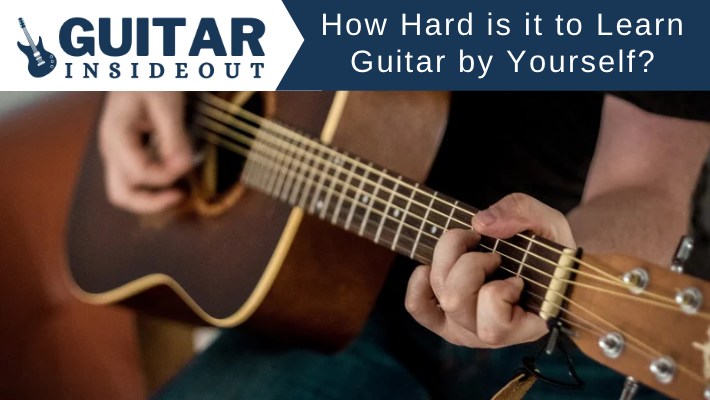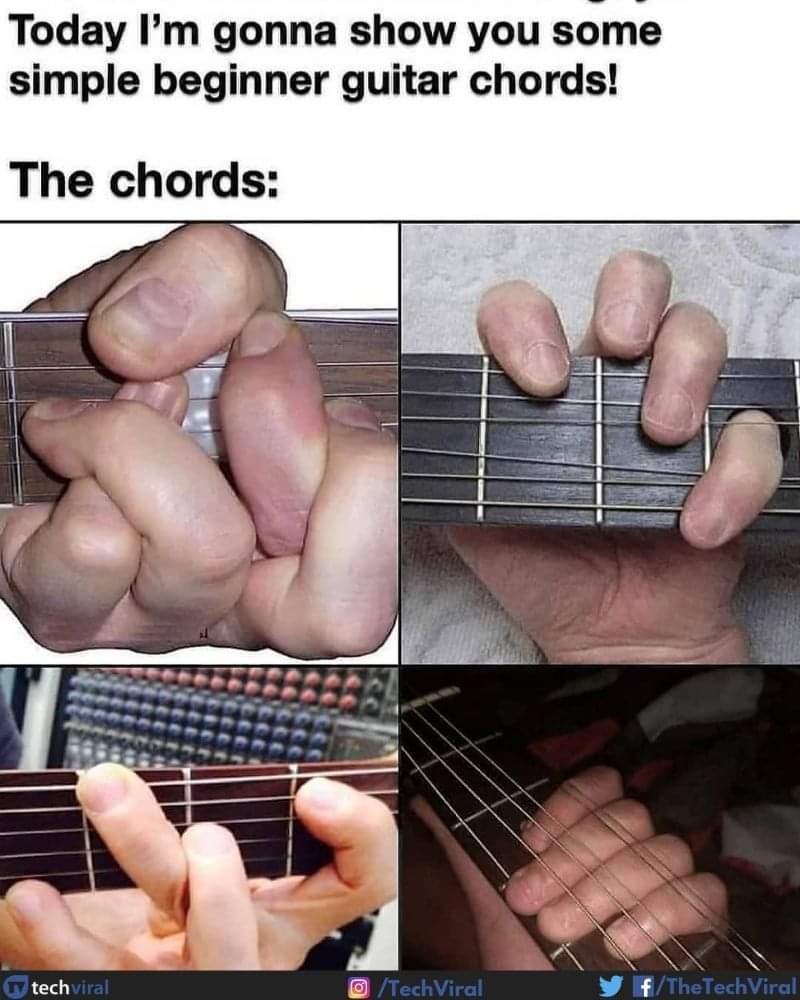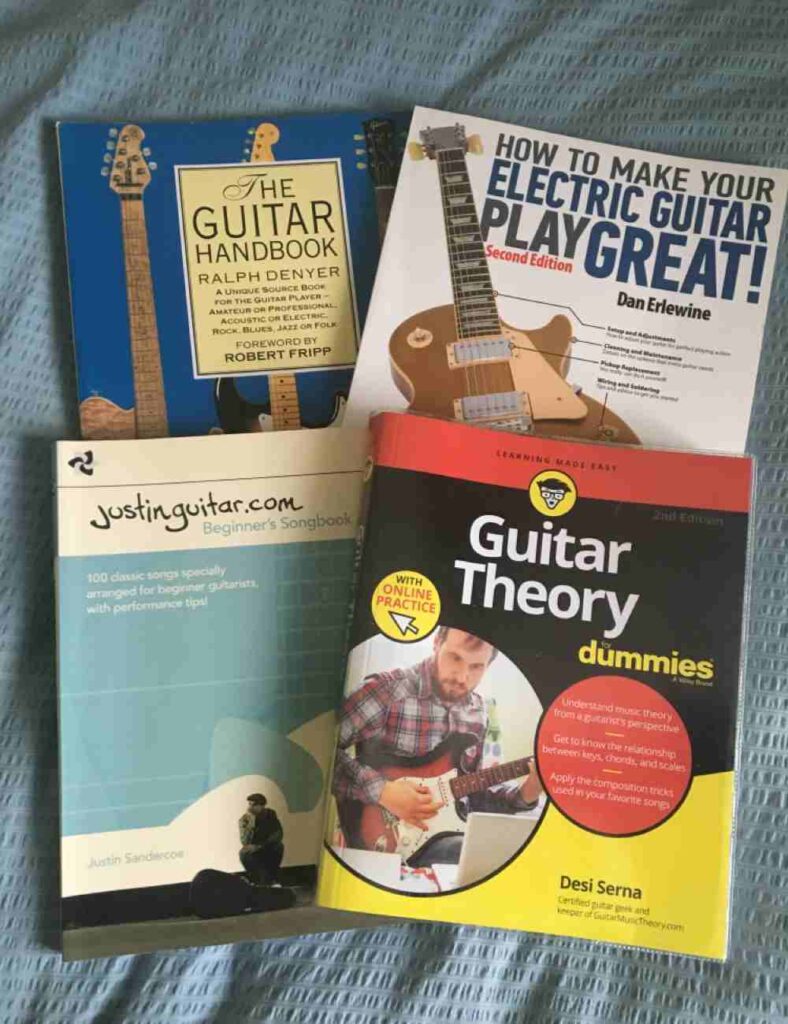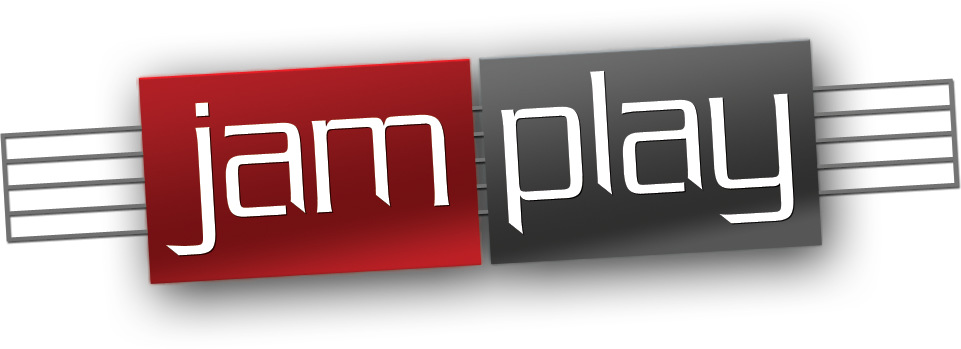Learning any new skill is difficult. Even more so when you have to do it on your own. So how hard is it to learn guitar by yourself?
Back when I was 15 I got my first guitar. I had never picked up a musical instrument let alone attempted to play one. I was unbelievably naive, knew nothing about guitars, how to hold a pick, how to strum etc. and I was on my own.
I didn’t want a teacher. I was both very shy and embarrassed about playing in front of anyone. So I had decided to go it alone and learn by myself. And that’s what I did.
Was it hard? Yes. Would I have learnt quicker with a teacher? Without a shadow of a doubt. But I still got there. I can play the guitar now! (how well I can play is another matter!)

So if you’re thinking of learning the guitar by yourself but aren’t sure how hard it’ll be then this guide should help you to come to decision.
We’ll take a look at both the drawbacks and positives of learning guitar by yourself. Is it just too hard or easily achievable? And ultimately should you get a teacher or go it alone.
How Hard is it to Learn Guitar by Yourself?
It all depends on how you go about learning yourself. Choosing the right resources and materials to help you learn is key.
If you follow the wrong advice and pick up bad habits it will set you back and be difficult to make progress. But if you use good websites, YouTube videos, courses and more you absolutely can learn guitar by yourself without too much trouble.
Some parts of learning the guitar are made simpler with a teacher. Having feedback or someone to asks questions can be helpful. But it doesn’t suit everyone.
Regardless of how you go about learning though its important to remember it will be hard. Everyone finds learning to play the guitar tough, be they self teaching or taught by a professional.

At first you might not be able to get your hands and fingers in the right places, it will hurt (you’ll need your calluses) and everything you do will sound… bad.
So be realistic and expect to struggle. Don’t assume you’re going to be blasting killer solos within a few weeks. It really doesn’t work like that!
How Long Does it Take to Learn Guitar by Yourself?
There isn’t a timeframe for learning guitar by yourself. It depends entirely on how often you practice and how dedicated you are.
If you play the guitar only on Saturday for 30 mins you’re not going to make any progress. If you practice for 30 minutes to a hour every day you’ll see improvements pretty quickly.
That’s all relative of course. “Improvement” at the early stages might be something as basic as getting better at switching between a D and G chord. Not nailing the Sweet Child O’ Mine solo.
But those little improvements add up and over time you will see noticeable progress being made. I can remember the days when I could barely strum properly or pick the most basic tune. To look back on how far I’ve come it’s amazing.
And that can be you too.

Is it Possible to Learn Guitar Without a Teacher?
Yes. Whilst some people learn better with a teacher it’s still very possible to learn guitar without one.
In fact there are many famous guitarists who are self taught, including Jimi Hendrix, Eric Clapton, Prince and many more.
Now, you’re unlikely to be the next Clapton (although who knows? Prove me wrong!) and that’s fine. But what it does prove is that many exceptionally good guitarists have learnt by themselves.
Most people just want to be ‘good’ at the guitar. That’s pretty vague but it’s doesn’t mean they’re aspiring to be the next Jimi Hendrix.
And being ‘good’ is an achievable goal for most people you’re teaching themselves.

Why a Teacher May Not be Right for You
Good guitars teachers are fantastic. Learning with a teacher who can shape lessons to suit you, find your weak spots and really focus in on them and inspire or motivate you to learn is wonderful.
But for everyone of those great teachers there are plenty of other less good ones. In fact there are an awful lot of just plain bad teachers.
And the bad ones can actually cause you more problems than learning by yourself. Unfortunately they’re either more concerned with making money than actually improving their students or have an extremely high opinion of themselves. It’s sad but that’s the truth.
So you might get lucky and find a great teacher. But you might also waste time and money going through loads of really rubbish ones. And that time would probably have been better spent teaching yourself.
Best Way to Learn Guitar by Yourself
There are lots of different ways you can choose to teach yourself guitar. There are also lots of bad ways too!
Tons of websites and videos will make big claims about learning in a few months or a quick ways/cheats to master the guitar. Avoid those at all costs.
There are no shortcuts. It’s all about following a tried and tested method and putting in the practice. It sounds simple but that’s all there is to it. Obviously it’s harder than that but the basic principle is practicing the correct techniques.
So, amongst the many different ways to learn which are best suited to you? Let’s go through the options.
Online Courses
Following a course or lesson plan that guides you through learning the guitar is probably the best way to learn by yourself. Having a structure and step by step approach to what you learn is always helpful and means you won’t be picking up random bits here and there.
The next best thing to an actual teacher are some of the courses you can follow online. These can be free or paid and usually combine video lessons with written explanations and exercises for you to do on your own.
There’s a good variety of courses aimed at different skill levels – beginner, intermediate and advanced – as well as courses for specific styles of music (like metal or fingerpicking) and for specific techniques (like improving speed).
While you won’t have the ability to ask someone questions directly or get feedback on your playing most of these courses are well designed, comprehensive and have helped thousands of people learn to play the guitar by themselves.
Apps
Apps tend to be similar to courses or just an extension of what a course already offers. What they do offer is the convenience of having lesson plans or tutorials on your phone/tablet whenever you want.
Being able to practice on the go or follow a lesson from your phone means you aren’t tied to your computer or laptop. The apps are usually well designed, easy to follow and have aspects you can even use if you haven’t got your guitar with you.
You can also get ear training apps that help you to improve your musical ear. Functional Ear Trainer is one of the best, has an app or software for PC and Mac, and is free to use.
YouTube
YouTube has probably had the most dramatic impact on learning the guitar. It’s made it so much more accessible for those learning by themselves.
You can find thousands of tutorial videos for theory, technique, practise routines, songs and more. It’s really great for a relaxed approach to playing songs or understanding certain topics.
Using both a course as mentioned above in conjunction with looking up tutorials for your favorite songs on YouTube is a great way to learn. You get the structured, disciplined learning from the course and then apply what you’ve learnt from it to those songs you want to play.
But you can also find a huge amount of information and help for every aspect of the guitar. Whilst you may be lacking the proper structure of a course or teacher you can still learn a great deal just by using YouTube.
The downsides to using YouTube is the lack of coordinated learning. You’re spending time searching for lessons and piecing bits together from different sources. It can be a bit of a mess.
Books
With websites, apps and YouTube now available using a book might seem a bit old fashioned. But there are some fantastic ones that will really help you.
Books also allow you to follow a structured plan at your own pace. You can pick it up and put it down whenever you like.
If you don’t have access to a computer or your phone you can still practice if you’ve got a book.
Be warned though – there are so many books out there and a lot of them won’t be great. Finding a good one is the challenge.
A few I would recommend are:
- Complete Idiot’s Guide to Playing the Guitar by Frederick Noad – a great starting point for those wanting to play electric/rock guitar.
- The Guitar Handbook by Ralph Denver – more of a reference book than a guide. Great for referring back to for chords, scales and general information about the guitar.
- How to Make your Electric Guitar Play Great by Dan Erlewine – an excellent guide to setting up your guitar yourself so it plays properly.
- Guitar Theory for Dummies by Desi Serna – a really good place to start with theory.

Tabs
Tabs are good because you can very quickly begin playing songs. Lots of people find the initial stages of learning the guitar frustrating because they’re struggling to hold down the frets, strum etc. but also are learning some fairly boring, if important, concepts.
It’s important to know scales, chord shapes and so on but a lot of us just want to start playing songs. That’s often why we pick up the guitar in the first place. And tabs can be a way to learn some really basic, easy songs early on.

Something like White Stripes – Seven Nation Army or Deep Purple – Smoke on the Water are very simple but sound awesome. It can keep you motivated to learn the more mundane parts if you feel like you’re actually playing proper songs at the same time.
You do have to be careful not to become reliant on tabs though. Getting to the position whereby you can only play by reading a tab is not recommended.
Try to incorporate some music theory and ear training as part of a well rounded practice routine. If all you do is learn songs from tabs you’ll reach a point where someone asks you to play the guitar for them, or join a jam, or band, and you won’t have any idea what to do.
So tab can be limiting as well as helpful. Do use it but don’t rely on it.
By Ear
This is arguably the most difficult. There are some people who will naturally have a good ear and be able to replicate what they hear quickly and easily. But for most of us playing by ear takes time and proper training.
So to try and learn from scratch this way, with no previous experience, is going to be very difficult. In the past copying what you heard on the radio or slowing down your record player was the only way to learn the guitar by yourself. But with all the options available to us today there are far easier ways to learn the guitar.
But don’t ignore ear training. It’s a vital skill to have and will become even more so as you progress with your learning.
Tips for Learning by Yourself
1. Plan in Advance – this is important because it’s really easy to get lost in the huge amount of information out there. You need to decide exactly what you want to or should learn and plan it out. Otherwise you’re going to just be randomly choosing topics or techniques and have no structure. For example it would be ridiculous to try and learn sweep picking, an advanced technique, early on as you wouldn’t have any grounding in the more basic techniques to achieve it.
2. Make a Practice Routine – this follows on from your planning. Once you know what you want to or should be learning then make a routine you can stick to every day. Divide technique, theory, song practice etc. in to 15 minute chunks, for example. And then practice! It’s the most important thing you can do. You won’t make any progress if you don’t put in the hard graft.
3. Record and Video Yourself – this may feel awkward or embarrassing at first but it’s worth it. Firstly you can see your own technique and what needs to be worked on or to change. Secondly you’ll notice your progress. Looking back on a video from 3 months earlier you’ll see how far you’ve come and how much better you’ve got. This will be a real motivator because if you see the progress being made you’ll want more. It’ll inspire you to keep playing, especially when you hit plateaus or struggle (which you will! We all do and did!)
4. Practice Often – practicing for smaller amounts of time but more often is better than one big chunk of time. So 15 minutes every day is much better than 3 hours one day a week. It’s also a lot easier for most people. Finding 15 to 30 minutes every day shouldn’t be too hard. If you can play for longer then go for it! But that regularity of daily practice is essential.
Top Online Courses for Learning Yourself
There are probably hundreds of courses out there but these are just a few of the most well known. Some are free whereas some will offer a free trial before you need to subscribe.
Give one or some of them a try and see which fits you best.

JustinGuitar is probably the most popular and arguably the best. It’s almost entirely free and a great starting point for both beginners or those looking to go back over the basics. Justin covers everything including technique, theory, songs and improvising. Highly recommended.

Fender Play is relatively new (launched in 2017) but has grown rapidly. Fender are obviously one of the most established guitar brands and so you’d expect their app to reflect that. It’s fully featured and easy to use with lots of video tutorials and lessons. A really good price for what you get, too!
Try the Fender Play Two Week Free Trial: Step-by-Step Online Lessons for Guitar, Bass & Ukelele.

Guitar Tricks have been around for over 20 years now so know what makes a good guitar course. There are literally thousands of lessons as well as separate apps for theory, tuning etc. You get a lot and it will undoubtedly help you learn but Guitar Tricks is quite expensive.

Jamplay Jamplay have also been around a long time so boast a strong reputation. There are fewer lessons than the likes of Guitar Tricks but they tend to be very in depth. Combined with live workshops and group lessons (putting the ‘jam’ in Jamplay I guess!) it makes for an effective learning process.

TrueFire have arguably the best and largest number of lessons and video tutorials. However, True Fire probably isn’t the best option if you’re a complete beginner. It tends to cater to those who have a little bit of experience. Having said that if you’re truly committed then in the long run True Fire may be your best option.
Conclusion
Learning the guitar by yourself isn’t easy. Learning the guitar is hard, full stop.
It requires dedication, determination and time. If you don’t have those then whichever way you choose to learn you won’t succeed.
But if you do really commit to learning and plan it thoroughly you absolutely can learn by yourself. There will be challenges and undoubtedly frustration but it’s what everyone goes through.
If you have decided to learn yourself then stick with! Find some top materials and resources – one of the courses or YouTube channels mentioned – and really give it your all. It’ll be worth it in the long run.

Playing guitar is only something you can do if you already have talent. If you don’t have any talent, no amount of practice will make any difference.
I disagree Mark. Having a natural aptitude for guitar or music will definitely help, but with hard work you can absolutely go from nothing to decent. I have no particular talent and have struggled with a lot of aspects of learning (smaller hands, music theory was a huge hurdle for me etc). But I kept working at it, had the desire, motivation and drive and have made massive strides. I’m no Hendrix, obviously, but I can play a bit.
So if you put in the work, properly practice and practice well (not just noodling around for an hour!) you will improve and get better. There really isn’t any secret to it other than that.